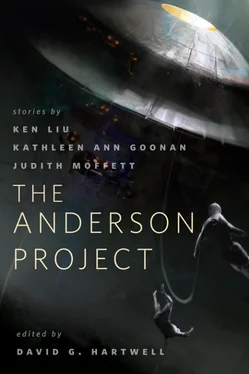As far as I could tell, the woman lived on a shoestring—hand to mouth, grant to grant. But she seemed happy, despite her unemphasized but obvious lack of funds. I had money coming out of my ears. The idea of helping her out in this good cause gave me kind of a do-gooder feeling. I often thought I should do something good. Maybe, I thought, this is it.
The minute she stepped onto the narrow trail, where lush tropical forest pressed in on both sides and gusts of wind brought spatters of rain that soaked us, she began to talk. “We live parallel lives with animals. We co-evolved, and yet we’re so insular. We’re impacting their habitats, killing them, and we have so much to learn from them. If people only understood what it means—”
“What what means?”
And so it began, with her following closely behind and me hanging on her every word, tossing back interruptions like small stones—or bread crumbs. I found that that instead of rising to the bait when I needled her every three minutes—a bad habit that upset most people—she always responded with patience. I liked that. Soon I realized that for her these were opportunities; teachable moments. I’m smart, sure, but socially and emotionally I’m in the stone age. Knowing that never changed my behavior, and it may be the reason I spend most of my time with computers. Or maybe it’s the other way around.
Jean said, “Every species has niche-evolved skills, ways of interpreting the environment. Our senses and our skills evolved for survival. The species that have survived are descended from the wariest, so we don’t intermingle. We can’t. We might kill or be killed. But we’re just learning what human consciousness is, and that it isn’t the only form of consciousness. We have so much to learn from each other! For instance, I think that mathematics could be enriched by a native model of flocking behavior.”
“We actually do flock,” I offered. “We flock with our minds. In opinions, ideas, art, science. We test, we keep our distance, we draw together, we change our theories en masse, engage in political movements, have revolutions.”
“Hmmm,” she allowed. “Yeah. Language is like that—emergent. Emergence is cooperation of things of unlike kinds. Lewes said that in 1870s. I think.”
If there’s anything I know a lot about, it’s emergence. G. H. Lewes, a philosopher, had coined the term and defined it, as this increasingly remarkable woman had just pointed out. Emergence is self-organized and unpredictable. It tickles and delights the human mind (while it may dismay politicians or those who make financial predictions) because of its propensity to spring from events, properties, social currents, whatever, that would seem unconnected, almost as if their sheer unlikeness has drawn them together and created new energy.
“A lot of things were shakin’ back in the nineteenth century, that’s for sure, I said.” I’d heard the term “emergent” applied to language, and perhaps her surprising perspicacity jolted this sardonic, dismissive response out of me—suddenly, she was on my turf.
“Well, blow it off if you want.” Her voice was low, strong, and sure, and in it I heard a shrug.
“I’m trying to have a conversation. With you it’s—well, having a conversation with you seems to be an exercise in emergence. According to your definition—‘things of unlike kinds.’ Or Lewes’ definition.”
She laughed, then the sound of her footsteps paused for a second. “Oh! What’s that smell?”
“ Awapuhi kuahiwi . Ginger. So… what do think you’ll learn? You’ve said that you think Meitner is unique.”
“I think every brain is unique, but mostly in small ways. She may be unique in large ways. And I don’t know what I’ll learn. That’s the point. I guess I’m just curious.”
Entranced would have been a better word. As was I—not with Meitner, but with Jean.
And that name! Lise Meitner was the physicist who confirmed that nuclear fission was possible. In the late forties, she was called “The Mother of the Atomic Bomb,” a title she hated. Deeply pacifist, she had turned down an invitation to work on the Manhattan project, and had earlier risked her career during World War I when she turned down the opportunity to work with her mentor, Otto Hahn, on developing ever more potent poison gas. Instead, to fill out her mandatory war-effort dance card, she went to the German front and used the new technology of X-rays to diagnose the shattered bones of German troops.
When I joked about laying such a heavy mantle on a mere bird, as we huffed up the steep, slippery ridge and rain forest gave way to views of the canyon and the blue Pacific, Jean bridled. I’d say that’s when I first began to fall in love with her, but that’s not true—that began to happen when I read her visionary proposal, though I didn’t realize it. I could tell, then, that she played a long game. Her vision of the possible shone like an isolated, sharp, brilliant ellipse of sun far out on an otherwise stormy sea, and I admired that. I prefer the long game as well. What I’m doing might not ever bear fruit, but it’s a worthy and fascinating goal. Or obsession.
The trail to the hale —the semi-traditional Hawaiian house I’d offered for her use for her study—steepened on the knife-edge of a ridge. Wild goat country. I yelled over my shoulder, “Her name—like Einstein, the parrot? The parrot is funny—why not, um, Lucille Ball? Or Julie Andrews. The parrot can sing, right?”
I heard Jean’s slogging footsteps stop, and I turned to look down at her. Her face red (she was slightly overweight, sunburnt, and not in very good shape), she was sitting on a rock, apparently unfazed by the sheer drop behind her. She unhooked her water bottle from her belt and took a long gulp. Her chin-length red hair stuck to her cheeks.
I got the feeling she’d heard that jibe before, and thought, I’m in for it now. It was a careless remark. I’d taken Dr. Woodward seriously enough to offer her some support for her endeavor, so I’m sure the tone was unexpected.
She stared out a tiny triangular patch of Pacific Ocean, far below at the end of a widening valley. Finally she said, “Lise Meitner’s extraordinary gifts were invisible to the society she lived in—Vienna in 1900. It was illegal—illegal!—for girls to attend school after eighth grade.” Despite a gust of cool wind, her face flushed deep pink. “She had to get a tutor—”
“I know,” I told her, a bit nettled. I’d just read Meitner’s most recent biography. “She got her doctorate in physics, went to Berlin, pretty quickly became part of the in-crowd in theoretical physics. Bohr, Einstein, all those guys.”
“Right. All those guys .” But she smiled. “Anyway, sure, I guess it’s pretentious, but it fits. We have no idea what she’s capable of. We have no idea what any animal really thinks, or any other human, for that matter. Parrot Meitner has had some kind of—well, let’s be positive, and call it enhancement, although it might just be damage. I don’t know if you read the whole proposal and background.”
I had. “I know that these parrots can talk, but do they really understand what they’re saying?”
She stood. “How much farther?” She passed me and pushed on in silence for a few minutes, then yelled over her shoulder, “They can spell phonetically. They can formulate situation-appropriate questions. They can add and subtract.” She turned and faced me. “Think of how you might meet an alien, and although your minds and worlds might be very different, you might strive to establish a bridge of mutually understood testable hypotheses about what you are each thinking. Language is a model, and it is also a reduction, a focal point.”
Читать дальше












